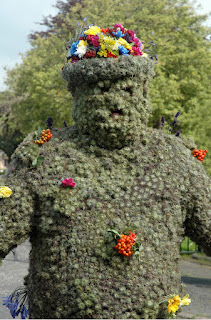In short: for one day each August, a local (honoured) male volunteer gets covered head to toe in burrs, and collects money while being taken to various pubs - where (because his face is covered in burrs) he gets offered whiskey, to consume using a straw!
Also, due to the sticky and prickly properties of burrs, he has to walk with his arms stretched out for the entire day. To help, his arms might be supported by flower-covered sticks, or by (normally dressed) companions in the procession. The entire celebration is known as the The Burryman Parade, and is part of the town's annual Ferry Fair.
Why why why?? - I hear you cry! Well he's there to absorb bad luck, and spread good luck to the town. But where it all originated nobody is entirely sure. The Burryman has been a tradition for at least 300 years (actually quite recent by UK standards!) Some say he commemorates Queen Margaret's husband getting stuck in a gorse bush (!) But based on other festivals, it seems likely the tradition might date back thousands of years to pagan times, when the Burryman might have represented good luck, fertility, or even been a kind of human sacrifice or 'scapegoat' (to remove bad luck from the community). Luckily he's only a slightly drunk and prickly man these days. Either way, he's kind of scary in my opinion!
Before the burrs are attached, the annual volunteer puts on a special flannel suit (which makes the seeds stick well). Tradition dictates that he must collect the burrs and flowers for the costume himself. Once 'dressed' he can't really communicate, see or hear much, and depends on his attendants to guide him throughout the day. It sounds like a pretty grim job to me, but men tend to willingly hold the Burryman role for many years on end, so it must have some rewards (free whiskey possibly being one!)
You can read more about the festival here: http://www.ferryfair.co.uk/
Further reading on this blog:
Bonkers British Festivals no1: The Ottery Tar Barrels
Photo creds:
fingersports
Jamespearsonhowes.com


No comments:
Post a Comment